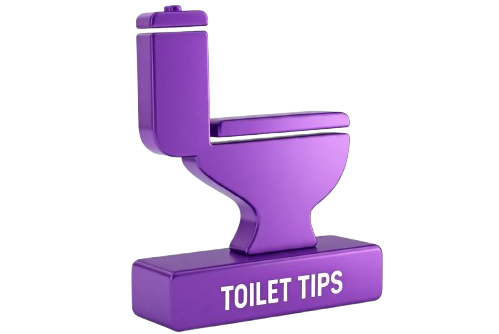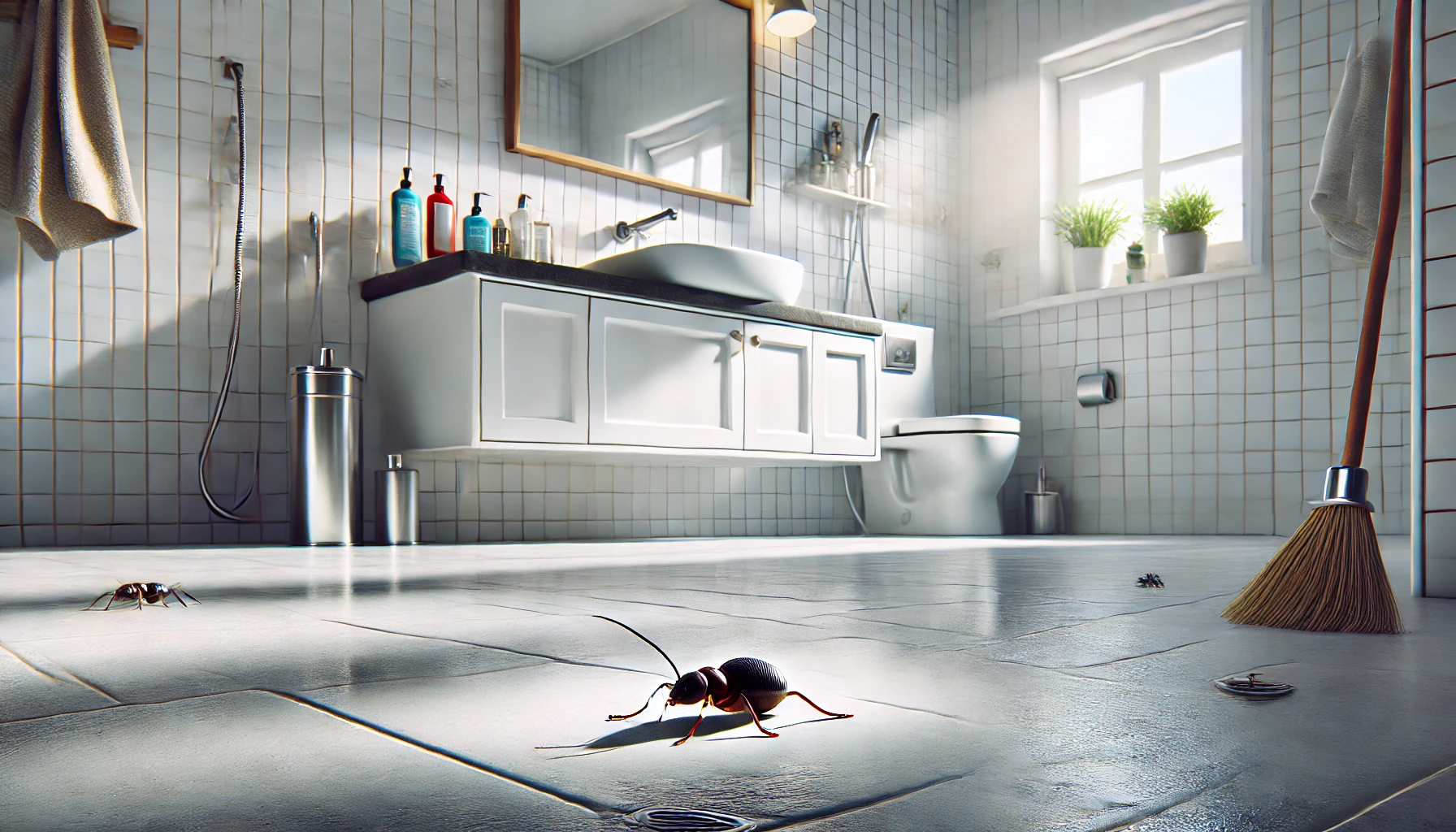Pissants, small ants attracted to moisture, often invade bathrooms due to leaky pipes, damp surfaces, or humidity. To get rid of them, focus on eliminating water sources, keeping the bathroom clean, and sealing entry points.
Natural repellents like essential oils or DIY vinegar sprays can also help, along with using bait stations or insecticides for more persistent infestations.
In this article, we’ll cover effective methods for cleaning, repelling, and preventing pissants, as well as long-term strategies to keep your bathroom pest-free.
Table of Contents
Understanding Pissant Behavior
Identifying the Problem
Before diving into solutions, it’s essential to confirm that the pests you’re facing are indeed pissants. These tiny ants are typically small, measuring around 1/16 to 1/8 inches in length. Unlike other ants attracted to sweets, pissants are drawn to moisture.
Why Your Bathroom?
Pissants are particularly drawn to bathrooms due to their ideal living conditions. These tiny pests thrive in environments with abundant water, which is often found in leaky pipes or from condensation on windows and mirrors.
Additionally, damp towels left hanging in the bathroom can also attract these unwanted guests.
Initial Cleanup: Reducing Attraction
Remove Water Sources
Pissants are attracted to moisture. To eliminate their water source, inspect and repair any leaking faucets or pipes. Clogged drains can also contribute to moisture buildup. Clean them regularly to maintain optimal water levels.
Dry bathroom surfaces thoroughly after use. Squeegee walls and doors to prevent moisture accumulation. By addressing these water sources, you can significantly reduce the pissant population in your bathroom.
Regular Cleaning
Hygiene is paramount in preventing pissant infestations. Regular cleaning is essential to eliminate their food sources and disrupt their trails.
Surfaces like countertops, cabinets, and floors should be wiped down with a vinegar solution made from equal parts vinegar and water. This solution not only cleans but also repels ants due to its strong scent.
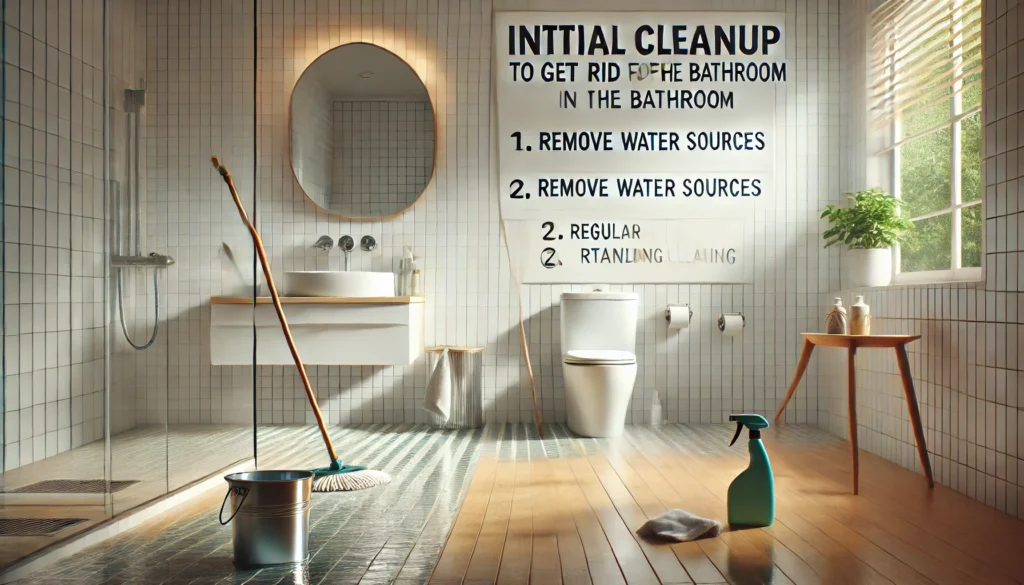
Natural Ant Repellents
Essential Oils
Peppermint oil is a powerful natural ant repellent. To use it effectively, soak cotton balls in the oil and place them near entry points and areas where ants are frequently seen.
You can also mix a few drops of peppermint oil with water and spray the solution around your bathroom or other affected areas.
Another effective essential oil for repelling ants is tea tree oil. Use it in the same way as peppermint oil, but be cautious as it can be irritating to the skin.
DIY Vinegar Spray
A simple and effective DIY vinegar spray can deter ants from entering your home. Simply mix equal parts vinegar and water in a spray bottle. The strong smell of vinegar repels ants and disrupts their scent trails.
Spray the mixture around entry points and areas where you have noticed ant activity. Keep in mind that vinegar has a strong odor, so it may not be ideal for use in areas where you want a pleasant scent.
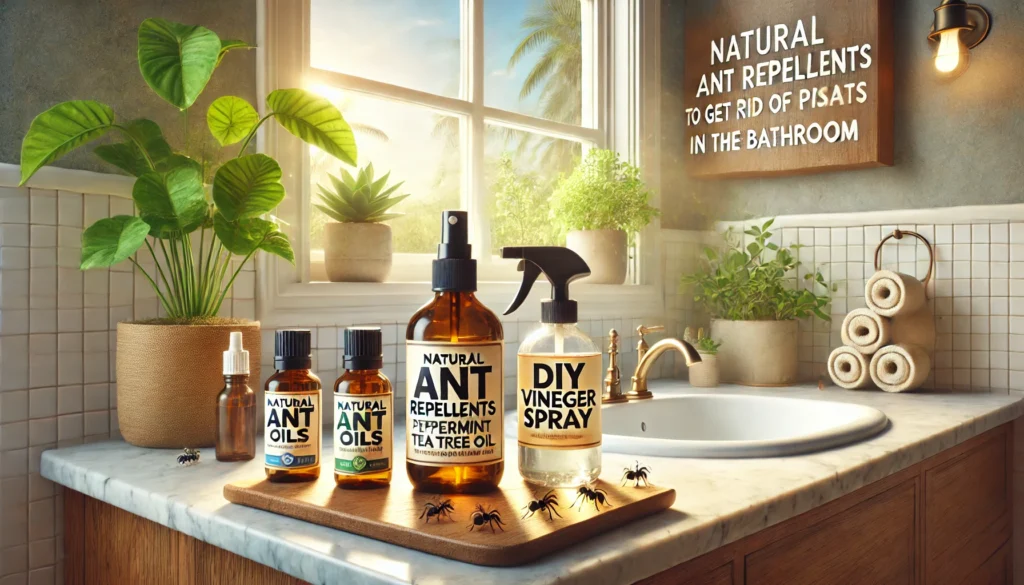
Chemical Ant Control
Bait Stations
Ant bait stations are a popular and effective method for controlling ant infestations. These stations contain a poisonous bait that attracts ants and is then carried back to their colony, where it is shared with other ants.
This process can lead to the elimination of the entire nest. However, it’s important to place bait stations strategically at entry points and in areas where ants are commonly seen.
Be cautious when using bait stations around children and pets to prevent accidental ingestion.
Insecticide Sprays
Insecticide sprays can be an effective way to eliminate ants, especially in confined spaces like your bathroom. When using insecticide sprays, make sure to follow the instructions on the label carefully and apply them directly to the ant trails and entry points.
However, be mindful of the potential risks associated with using chemicals in your home, especially if you have pets or children. Consider alternative methods or consult with a pest control professional if you have concerns.
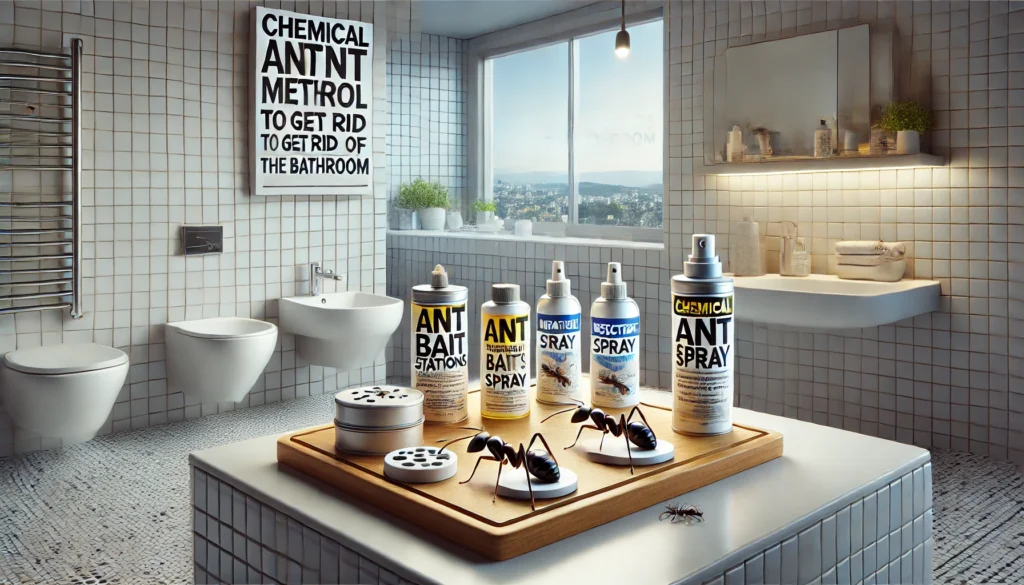
Sealing Entry Points
Caulking Gaps
To prevent ants from entering your home, it’s essential to seal any cracks or crevices they might use as entry points. This is particularly important in areas like your bathroom, where moisture can attract ants.
Pay close attention to caulking around pipes and walls to ensure no gaps remain that ants can exploit. By thoroughly sealing these entry points, you can significantly reduce the likelihood of an ant infestation.
Door Sweeps
Door sweeps are simple but effective tools for preventing ants and other insects from entering your home through bathroom doors and other entry points.
These rubber or plastic strips are attached to the bottom of your doors and create a barrier that prevents pests from crawling underneath.
By installing door sweeps on all exterior doors, you can significantly reduce the number of ants and other insects that find their way inside.
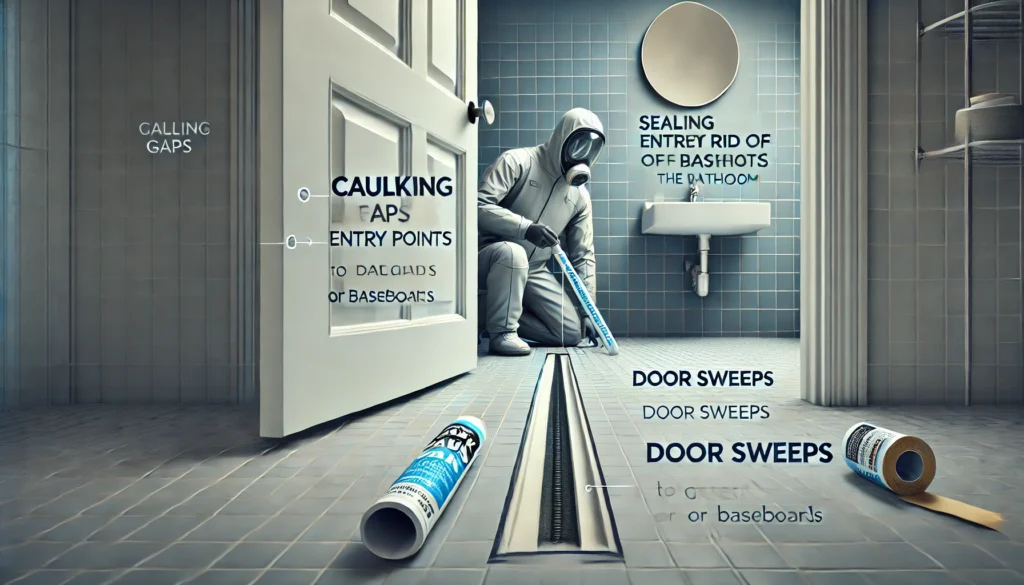
Long-Term Prevention Strategies
Ventilation
Ventilation is crucial for preventing moisture buildup, which attracts ants. Ensure your bathroom has adequate ventilation by running the fan during and after showers. Consider using a dehumidifier to further reduce humidity levels.
Routine Inspections
Regularly inspect your bathroom for early signs of ant activity. Pay close attention to areas where leaks or moisture can attract ants. By conducting routine inspections, you can identify potential problems before they escalate and take proactive measures to prevent future infestations.
Professional Help
If you’re struggling to eliminate or prevent ant infestations, consider contacting a professional pest control service. They can provide targeted and powerful solutions tailored to your specific needs. Their expertise can help you achieve long-lasting results and maintain a pest-free environment.
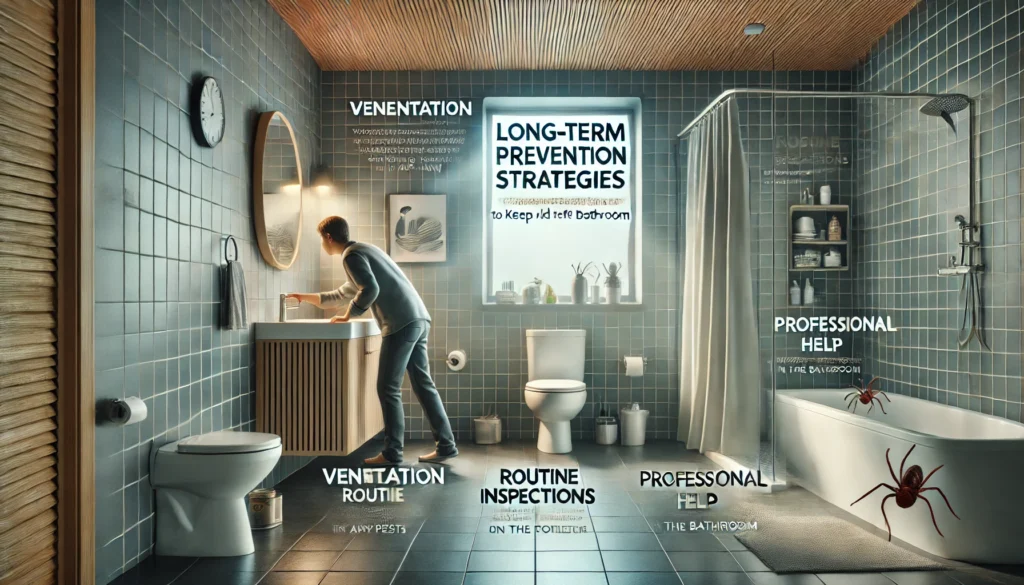
Conclusion
Eliminating pissants from your bathroom requires a combination of proper sanitation, moisture control, barriers, and chemical treatments.
By following these detailed steps, you can reclaim your space from these pesky invaders and maintain a cleaner, ant-free bathroom. Remember, consistency is key in both treatment and prevention.
Check Similar Bathroom Enviroment Guide: Can I Use Tempera Paint on My Bathroom Walls?
Frequently asked Questions
Why Are Pissants Attracted to My Bathroom?
Pissants, or sugar ants, are attracted to bathrooms due to the moisture-rich environment, often caused by leaks or humidity. Bathrooms provide an ideal breeding ground with frequent water sources like sinks, showers, and damp areas, making them a perfect spot for these ants.
What Natural Remedies Can I Use to Repel Pissants?
Essential oils like peppermint or tea tree oil are excellent natural repellents. Simply mix a few drops with water and spray around entry points and ant trails. Alternatively, a DIY vinegar spray made from equal parts vinegar and water can disrupt ant scent trails and discourage them from entering your bathroom.
How Do I Keep Pissants Out of My Bathroom Long-Term?
Long-term prevention includes routine cleaning, ensuring no water is left on surfaces, and sealing entry points like cracks or gaps around doors and windows. Regularly ventilate your bathroom and use a dehumidifier to reduce moisture, as ants thrive in damp conditions.
How Do Ant Bait Stations Work for Bathroom Pissants?
Ant bait stations lure ants with a poisonous bait that they carry back to their colony. The bait eventually kills the entire colony, helping to eliminate the infestation. Place these stations in areas where ants frequent, but keep them out of reach of pets and children.
What Chemicals Are Effective for Pissant Control in Bathrooms?
Insecticide sprays are useful for controlling ants in confined spaces like bathrooms. Apply the spray along entry points and ant trails, but follow label instructions carefully to avoid exposure risks, especially in spaces where pets or children are present.
Why Is Sealing Entry Points Important for Ant Control?
Sealing entry points like cracks and crevices helps prevent ants from entering your bathroom. Caulking gaps around pipes and installing door sweeps can block these small pests from finding their way inside, reducing the chances of recurring infestations.
How Often Should I Clean My Bathroom to Prevent Pissants?
Cleaning your bathroom regularly is essential to prevent ants from being attracted to food or water sources. Wipe down surfaces with a vinegar solution to deter ants, and make sure to dry areas prone to moisture buildup after use.
Can a Dehumidifier Help Control Pissants in My Bathroom?
Yes, a dehumidifier can reduce the humidity levels in your bathroom, making it less attractive to ants. Pissants thrive in moist environments, so using a dehumidifier is a helpful strategy for long-term ant prevention.
What Should I Do if Natural Remedies Don’t Work?
If natural remedies and preventive measures aren’t effective, consider using chemical treatments like ant bait stations or insecticide sprays. For severe infestations, contacting a professional pest control service can provide targeted solutions for lasting results.
Is Professional Pest Control Necessary for Bathroom Ant Infestations?
Professional pest control may be necessary if you’ve tried multiple DIY methods without success. Experts can apply specialized treatments and advise on further prevention, ensuring a more permanent solution to keep your bathroom free of ants.
